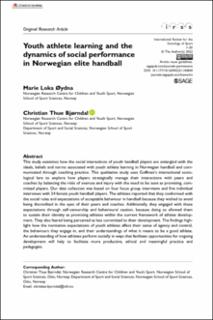| dc.contributor.author | Øydna, Marie Loka | |
| dc.contributor.author | Bjørndal, Christian Thue | |
| dc.date.accessioned | 2023-03-02T12:35:21Z | |
| dc.date.available | 2023-03-02T12:35:21Z | |
| dc.date.created | 2022-12-14T11:53:49Z | |
| dc.date.issued | 2022 | |
| dc.identifier.citation | International Review for the Sociology of Sport. 2022, Artikkel 10126902221140844. | en_US |
| dc.identifier.issn | 1012-6902 | |
| dc.identifier.uri | https://hdl.handle.net/11250/3055386 | |
| dc.description | This article is distributed under the terms of the Creative Commons Attribution 4.0 License (https://creativecommons.org/licenses/by/4.0/) which permits any use, reproduction and distribution of the work without further permission provided the original work is attributed as specified on the SAGE and Open Access page (https://us.sagepub.com/en-us/nam/open-access-at-sage). | en_US |
| dc.description.abstract | This study examines how the social interactions of youth handball players are entangled with the ideals, beliefs and norms associated with youth athlete learning in Norwegian handball and communicated through coaching practice. This qualitative study uses Goffman's interactional sociological lens to explore how players strategically manage their interactions with peers and coaches by balancing the risks of overuse and injury with the need to be seen as promising, committed players. Our data collection was based on four focus group interviews and five individual interviews with 24 female youth handball players. The athletes reported that they conformed with the social rules and expectations of acceptable behaviour in handball because they wished to avoid being discredited in the eyes of their peers and coaches. Additionally, they engaged with these expectations through self-censorship and behavioural caution, because doing so allowed them to sustain their identity as promising athletes within the current framework of athlete development. They also feared being perceived as less committed to their development. The findings highlight how the normative expectations of youth athletes affect their sense of agency and control, the behaviours they engage in, and their understandings of what it means to be a good athlete. An understanding of how athletes perform socially in ways that facilitate opportunities for ongoing development will help to facilitate more productive, ethical and meaningful practice and pedagogies. | en_US |
| dc.language.iso | eng | en_US |
| dc.subject | athlete development | en_US |
| dc.subject | elite sport systems | en_US |
| dc.subject | Goffman | en_US |
| dc.subject | impression management | en_US |
| dc.subject | rights and permissions | en_US |
| dc.subject | stigma | en_US |
| dc.subject | talent development | en_US |
| dc.title | Youth athlete learning and the dynamics of social performance in Norwegian elite handball | en_US |
| dc.type | Peer reviewed | en_US |
| dc.type | Journal article | en_US |
| dc.description.version | publishedVersion | en_US |
| dc.rights.holder | © The Author(s) 2022 | en_US |
| dc.source.pagenumber | 20 | en_US |
| dc.source.journal | International Review for the Sociology of Sport | en_US |
| dc.identifier.doi | 10.1177/10126902221140844 | |
| dc.identifier.cristin | 2093007 | |
| dc.description.localcode | Institutt for idrett og samfunnsvitenskap / Department of Sport and Social Sciences | en_US |
| dc.source.articlenumber | 10126902221140844 | en_US |
| cristin.ispublished | true | |
| cristin.fulltext | original | |
| cristin.qualitycode | 2 | |
